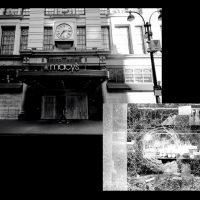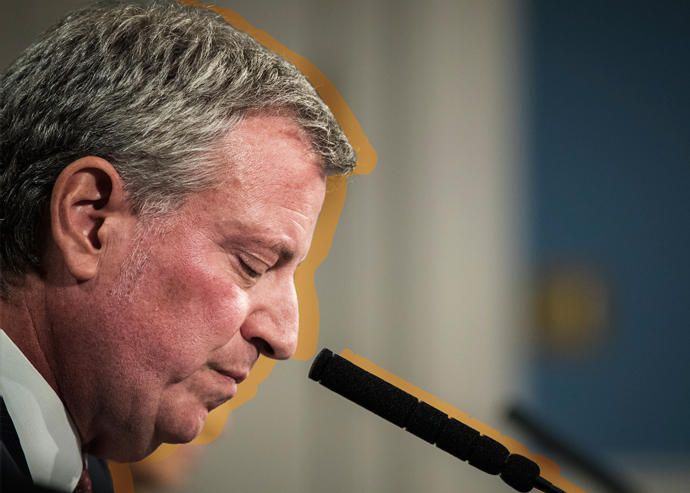“The most charitable assessment,” Neal Kwatra said of Mayor Bill de Blasio last week, “is that his mayoralty is currently on life support.”
The remark, made to the New York Times, was devastating not just for what it said but for who said it. Kwatra is a Democratic strategist steeped in New York politics who has worked for de Blasio and whose most important client, the Hotel Trades Council, is a de Blasio ally.
That Kwatra had reasons to downplay de Blasio’s problems but chose not to illustrates the magnitude of the moment. Police-reform backers were first galvanized by the killing of George Floyd, then infuriated by the mayor for defending the NYPD as it pummeled, pepper-sprayed and arrested protesters. The damage to de Blasio’s political capital was severe because the reformers were his base, leaving him with no clear constituency.
That’s bad news for real estate, industry insiders say.
“Developers are nervous,” said George Arzt, a publicist and political operative whose clients include Extell Development, Gilbane and Lendlease. Some are refraining from taking projects through the rezoning process, he said, “because they’re unsure of the politics in this city [and] unsure of the clout of the mayor, especially as he heads toward his lame-duck year.”
Others were even less generous.
“His political capital being completely obliterated certainly doesn’t help the real estate wheels go forward,” said one representative of a major developer, speaking anonymously because the firm has business before the city.
And development was not a priority for de Blasio in the first place, the source added.
Read more



The mayor’s office did not respond to a request for comment.
Indeed, de Blasio’s political demise dashes any hopes that he might rescue his housing plan, which began in 2014 with the goal of adding hundreds of thousands of market-rate dwellings, as well as 80,000 income-restricted ones. It hinged on $8 billion in subsidies and neighborhood rezonings that increased density, sparing developers from trudging through the city’s land-use review process for every large project.
The rezonings lost momentum first. Individual Council members in the South Bronx and northern Brooklyn claimed – in defiance of the laws of economics – that adding supply would increase rents. The mayor gave the members a pass, rather than call them out and risk his standing with their constituents.
That was an example of the lack of “leadership” that his former deputy mayor Alicia Glen, the architect of his housing plan, referred to repeatedly during a June 3 TRD webinar, albeit without mentioning de Blasio by name.
Then the subsidies vanished, a victim of pandemic-related, de Blasio-proposed budget cuts that Glen called “one of the most short-sighted things I’ve ever seen,” because the funding would leverage much more money from private sources. But given the mayor’s vulnerability, the council could pressure him into restoring some of those funds by making agency cuts elsewhere. The budget is due this month.
One neighborhood rezoning, of Gowanus, is still likely to pass because it is supported by the local City Council member, Brad Lander. But Lander now has even more power to dictate its terms, given that the public sees him as a champion of the protests. There are rumblings that the northern Brooklyn rezoning could re-emerge, but again, de Blasio would be subject to the whims of the local Council member, Antonio Reynoso.
As so often, grateful to follow the lead of @JumaaneWilliams as he points over the Brooklyn Bridge where we’ll be marching soon …
… and toward a future where we #DefundNYPD and replace the approach to public safety that puts policing first w/one that puts communities first. pic.twitter.com/U7PSOybpoe
— Brad Lander (@bradlander) June 9, 2020
Normally, a mayor could use his administrative power, bully pulpit and control of funding to sway local lawmakers.
“There’s a lot of leverage that the mayor has in ordinary times,” said Arzt. “These are not ordinary times.”
Early in his tenure, de Blasio pushed major development initiatives through the council, notably Mandatory Inclusionary Housing, which depended on future rezonings to spur projects. Some rezonings were approved after the mayor promised hundreds of millions of dollars in community benefits. But his influence has been diminishing in recent years, and the pandemic has cost him $9 billion in tax revenue. Then last week happened.
By imposing a curfew in response to one night of looting, the mayor created the conditions for unjustified arrests and conflicts with peaceful protesters, largely from his base of African-Americans and white liberals. And when the police engaged in troubling actions that were amplified on social media, the mayor acknowledged only a few such incidents and continued to profess that his police were showing “restraint” and a “light touch.”
Six years of progress in police-community relations were undone in six nights.
His now-former supporters called for him to resign, despite his decision to kill the curfew a night early. It didn’t help that de Blasio deemed the curfew a success, drawing outrage from City Council Speaker Corey Johnson.
“Protests against police brutality were met with more police brutality,” Johnson said in a searing statement Sunday. “The results were predictable. The mayor and the NYPD doubled down on a flawed strategy, falsely conflating looters with protesters and imposing a misguided curfew.”
The mayor and the NYPD doubled down on a flawed strategy, falsely conflating looters with protesters and imposing a misguided curfew — City Council Speaker Corey Johnson
Council member Kalman Yeger said the mayor was already in a weak position with only 19 months left in his term. “This is typical of mayors in year seven of an eight-year term,” the Brooklyn Democrat said, recalling that Rudy Giuliani and Michael Bloomberg were not popular at the same stage. “But he’s still the mayor.”
De Blasio certainly retains administrative powers important to the industry, such as measures that require the Department of City Planning. If he wants to permanently devote a traffic lane to buses, as he just did on 14th Street, his transportation agency can do so unilaterally. (Some believe traffic calming helps residential property values.)
But Johnson’s City Council has been increasingly successful in pushing the mayor into such actions. It pressured him to rent more hotel rooms and close dozens of streets to traffic to facilitate social distancing. Johnson also demanded outdoor dining, and the mayor responded with an initiative that restaurants could employ as soon as June 22. In his latest concession, the mayor abandoned his proposed increase to the NYPD budget and vowed to divert some police funding to youth services, as Johnson demanded it.
And that was before the mayor — who has long been unpopular with ethnic whites, as political consultants call the predominant populations of Staten Island, southern Brooklyn and eastern Queens — alienated his last bastion of support with the curfew fiasco.
An aide to another big developer said the mayor’s loss of influence “creates a massive power vacuum in the city. That vacuum will be filled by the governor.” And Gov. Andrew Cuomo, the aide noted, is “is less reactive and more thoughtful on real estate issues than the mayor.”
Real estate insiders hope that de Blasio could still advance projects to help the city recover from the coronavirus shutdown.
“What’s more important to his legacy?” said Ken Fisher, a land-use attorney at Cozen O’Connor and former City Council member. “That he doesn’t get remembered as a gentrifier or that he’s remembered for leveraging real estate and construction for a swifter recovery and giving confidence in New York’s future?”
Johnson, too, will be motivated to amp up his development credentials, given that he’s running for mayor in 2021.
“In the next 18 months, he needs to build a track record on economic recovery,” noted the developer’s representative. “Having projects killed in the City Council under his watch during skyrocketing unemployment and severe fiscal strain is not a good look. There’s hope that Corey will adopt a pro-growth approach.”
The legislature, City Council and governor are going to govern around him now. They won’t deal with de Blasio because they don’t need to. — veteran Democratic operative
Johnson has gained from de Blasio’s fall from grace. Moreover, dozens of current Council members are term-limited and may be hoping for jobs in a Johnson administration, which could give him leverage with those who have big rezonings pending before them, such as Industry City’s in the Sunset Park district of Carlos Menchaca.
“Bill de Blasio is impotent now and a lame duck for all intents and purposes,” the operative said. “The [state] legislature, City Council and governor are going to govern around him now. They won’t deal with de Blasio because they don’t need to.”
